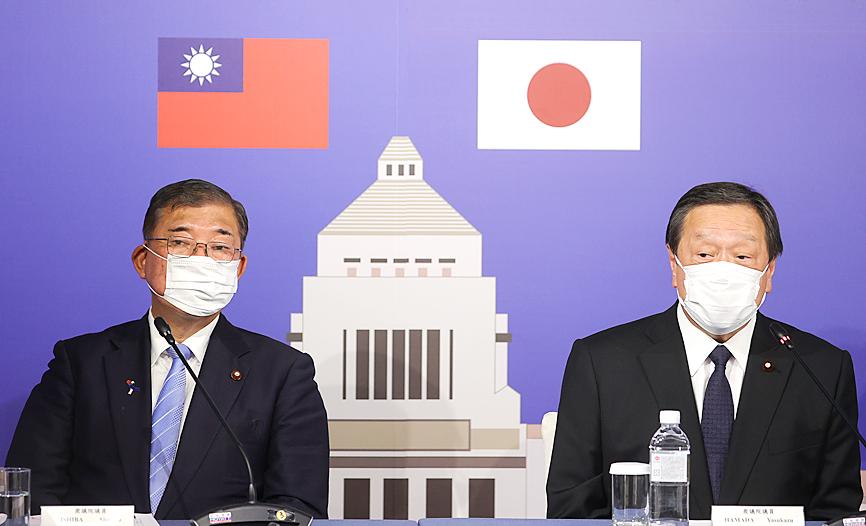Support for Taiwan in the Japanese Diet is bipartisan and would remain unchanged after the assassination of former Japanese prime minister Shinzo Abe, a visiting delegation of Japanese lawmakers told a news conference in Taipei yesterday.
The Japanese parliament recognizes the importance of Japan-Taiwan relations, and has shown bipartisan sympathy and support for Taiwan, said former Japanese minister of defense Shigeru Ishiba, who led the four-member delegation to Taiwan for a four-day visit.
The efforts to further develop and promote bilateral relations are to continue after Abe’s sudden death, added Ishiba, who was Japan’s defense minister from 2007 to 2008.

Photo: CNA
Abe died on July 8 at the age of 67, hours after being shot twice by a man using a makeshift shotgun during an election campaign event on a street in Nara, near Osaka.
The longest-serving Japanese prime minister was viewed by many in Taiwan as a staunch supporter of the nation.
Echoing Ishiba’s views, former deputy minister of defense Akihisa Nakashima said that promoting Japan’s ties with Taiwan had never relied solely on the late former prime minister, but that it was the effort of Diet members across party lines.
The delegation, which consists of lawmakers focusing on defense affairs, visited Taiwan to discuss with officials how the two sides could collaborate on security matters, Nakashima said.
Some European nations had swiftly increased their engagements with Taiwan in the wake of the Russian invasion of Ukraine, Nakashima said, adding that Japan should make similar efforts to elevate its relations with Taipei.
The delegation, which also includes former Japanese minister of national defense Yasukazu Hamada and Diet member Takayuki Shimizu, has since their arrival on Wednesday met with President Tsai Ing-wen (蔡英文), Vice President William Lai (賴清德), Premier Su Tseng-chang (蘇貞昌) and Chinese Nationalist Party (KMT) Chairman Eric Chu (朱立倫).
Asked what security cooperation details were discussed with Taiwanese officials, Ishiba declined to comment, citing confidentiality, but added that the visit provided the delegation with a better understanding of the Taiwanese military’s command and control operations.
The delegation hopes that these insights can contribute to developing Japanese security policy, Ishiba added.
While Japan has the responsibility to contribute to peace and stability in the Asia-Pacific region, whether its defense forces should intervene in the event of a regional conflict remains to be discussed in the country, Ishiba said.
The delegation ended the trip and left for Japan yesterday.
The news conference followed a visit by the delegation to former president Lee Teng-hui’s (李登輝) grave at a New Taipei City military cemetery, where the delegates paid their respects to Lee, who died two years ago.
They were accompanied by ambassador-at-large for digital New Southbound Policy initiatives Lin Chia-lung (林佳龍), according to the Lee Teng-hui Foundation.
Lin is also the Democratic Progressive Party’s New Taipei City mayoral candidate in November’s local elections.
Lee, Taiwan’s first popularly elected president, who passed away at the age of 97, spoke fluent Japanese and was known for his Japan-friendly views.

AIR SUPPORT: The Ministry of National Defense thanked the US for the delivery, adding that it was an indicator of the White House’s commitment to the Taiwan Relations Act Deputy Minister of National Defense Po Horng-huei (柏鴻輝) and Representative to the US Alexander Yui on Friday attended a delivery ceremony for the first of Taiwan’s long-awaited 66 F-16C/D Block 70 jets at a Lockheed Martin Corp factory in Greenville, South Carolina. “We are so proud to be the global home of the F-16 and to support Taiwan’s air defense capabilities,” US Representative William Timmons wrote on X, alongside a photograph of Taiwanese and US officials at the event. The F-16C/D Block 70 jets Taiwan ordered have the same capabilities as aircraft that had been upgraded to F-16Vs. The batch of Lockheed Martin

US President Donald Trump yesterday announced sweeping "reciprocal tariffs" on US trading partners, including a 32 percent tax on goods from Taiwan that is set to take effect on Wednesday. At a Rose Garden event, Trump declared a 10 percent baseline tax on imports from all countries, with the White House saying it would take effect on Saturday. Countries with larger trade surpluses with the US would face higher duties beginning on Wednesday, including Taiwan (32 percent), China (34 percent), Japan (24 percent), South Korea (25 percent), Vietnam (46 percent) and Thailand (36 percent). Canada and Mexico, the two largest US trading

GRIDLOCK: The National Fire Agency’s Special Search and Rescue team is on standby to travel to the countries to help out with the rescue effort A powerful earthquake rocked Myanmar and neighboring Thailand yesterday, killing at least three people in Bangkok and burying dozens when a high-rise building under construction collapsed. Footage shared on social media from Myanmar’s second-largest city showed widespread destruction, raising fears that many were trapped under the rubble or killed. The magnitude 7.7 earthquake, with an epicenter near Mandalay in Myanmar, struck at midday and was followed by a strong magnitude 6.4 aftershock. The extent of death, injury and destruction — especially in Myanmar, which is embroiled in a civil war and where information is tightly controlled at the best of times —

China's military today said it began joint army, navy and rocket force exercises around Taiwan to "serve as a stern warning and powerful deterrent against Taiwanese independence," calling President William Lai (賴清德) a "parasite." The exercises come after Lai called Beijing a "foreign hostile force" last month. More than 10 Chinese military ships approached close to Taiwan's 24 nautical mile (44.4km) contiguous zone this morning and Taiwan sent its own warships to respond, two senior Taiwanese officials said. Taiwan has not yet detected any live fire by the Chinese military so far, one of the officials said. The drills took place after US Secretary